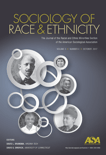
Sociology of Race and Ethnicity
Scope & Guideline
Pioneering insights into sociological dimensions of diversity.
Introduction
Aims and Scopes
- Critical Race Theory and Structural Inequalities:
The journal consistently focuses on critical race theory as a lens to analyze systemic inequalities across various spheres, including education, health, and criminal justice. - Intersectionality and Social Justice:
A significant emphasis is placed on intersectionality, exploring how race interacts with other social categories such as gender, class, and sexuality to shape individual and collective experiences. - Racial Capitalism and Economic Dimensions of Race:
The journal investigates the interconnections between race and capitalism, highlighting how economic structures perpetuate racial inequalities and the implications for marginalized communities. - Global Perspectives on Race and Ethnicity:
Incorporating a global lens, the journal examines racial and ethnic issues beyond the U.S. context, addressing colonial histories and contemporary transnational dynamics. - Community Resistance and Activism:
The journal showcases research on grassroots movements and community activism, focusing on how marginalized groups mobilize against racial oppression.
Trending and Emerging
- Environmental Justice and Race:
Recent publications increasingly explore the intersections of race and environmental issues, particularly how marginalized communities are disproportionately affected by environmental degradation and climate change. - Mental Health and Racial Disparities:
There is a growing focus on the mental health impacts of racism, particularly during crises such as the COVID-19 pandemic, emphasizing the psychological dimensions of racial discrimination. - Digital and Media Representations of Race:
Emerging themes include the analysis of digital platforms and media representations, examining how online spaces shape racial identities and perpetuate or challenge stereotypes. - Abolitionist and Anti-Carceral Perspectives:
The journal is increasingly publishing works that advocate for abolitionist frameworks, critically examining the carceral state and envisioning alternatives to traditional punitive systems. - Transnational and Diaspora Studies:
There is a notable rise in research focusing on transnational identities and diaspora experiences, reflecting a broader understanding of race and ethnicity in a globalized world.
Declining or Waning
- Traditional Racial Categories and Essentialism:
There is a noticeable decline in research that relies on fixed racial categories or essentialist notions of identity, as the discourse increasingly favors more fluid and context-dependent understandings of race. - Focus on Historical Racial Narratives:
While historical perspectives remain important, there has been a reduced emphasis on historical narratives of racial oppression in favor of contemporary analyses and future-oriented discussions. - Overemphasis on Quantitative Studies:
The journal appears to be moving away from an exclusive focus on quantitative methodologies, with less frequent publications centered on large-scale statistical analyses of racial data.
Similar Journals
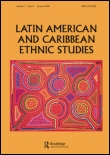
Latin American and Caribbean Ethnic Studies
Cultivating Knowledge in Anthropology and SociologyLatin American and Caribbean Ethnic Studies, published by Taylor & Francis Ltd, stands as a pivotal platform for scholarly dialogue in the realms of anthropology, cultural studies, sociology, and political science. With an ISSN of 1744-2222 and E-ISSN of 1744-2230, this journal has established itself since its inception in 2006, covering a diverse array of topics up to the year 2024. Recognized for its academic rigor, it is categorized within the Q2 and Q1 quartiles based on the 2023 rankings, showcasing its significance within these fields; it ranks in the 79th percentile for cultural studies and 62nd percentile for anthropology according to Scopus. The journal is not only an essential resource for researchers and professionals, but it also serves as an educational tool for students interested in understanding the complex ethnic landscapes of Latin America and the Caribbean. Although it is not an open access journal, its high-impact research contributions make it invaluable for those committed to advancing knowledge in these critical areas of study. This publication fosters a deeper comprehension of the intersectionality of identity, culture, and politics in these regions, thus bridging theories and practices that resonate globally.
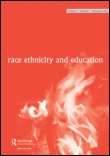
Race Ethnicity and Education
Fostering dialogue for social justice in education.Race Ethnicity and Education is a premier interdisciplinary journal published by Routledge Journals, Taylor & Francis Ltd, dedicated to exploring critical issues at the intersection of race, ethnicity, and educational practices. With an impressive impact factor and distinguished Scopus rankings placing it in the top quartile across categories such as Cultural Studies, Demography, and Education, this journal provides a rich platform for innovative research that addresses the complexities of educational equity and social justice. Since its inception in 1998, the journal has aimed to advance knowledge in these crucial areas, facilitating scholarly dialogue among researchers, educators, and policy makers. With a commitment to disseminating high-quality research, Race Ethnicity and Education plays an essential role in shaping the future of educational discourse, making it a must-read for anyone invested in the fields of education and social justice.

IDENTITIES-GLOBAL STUDIES IN CULTURE AND POWER
Bridging Cultures: Where Identity Meets PowerIDENTITIES: Global Studies in Culture and Power, published by Taylor & Francis Inc, is a distinguished academic journal dedicated to the exploration of cultural identities within a global context. With its ISSN 1070-289X and E-ISSN 1547-3384, this journal has established itself as a key platform for scholars interested in the intersections of culture, power, and identity since its inception in 1994. As a premier Q1 journal in the fields of Anthropology, Arts and Humanities, and Cultural Studies, it ranks highly among its peers, holding notable positions such as #69 in Social Sciences – Cultural Studies and #45 in Social Sciences – Anthropology, reflecting its influence and relevance in contemporary academic discourse. While the journal operates under a subscription model, it remains committed to presenting high-quality, peer-reviewed research that contributes to our understanding of global identities. Its critical analyses and theoretical advancements make it an invaluable resource for researchers, professionals, and students who aim to delve into the complexities of culture and power dynamics in today's world.
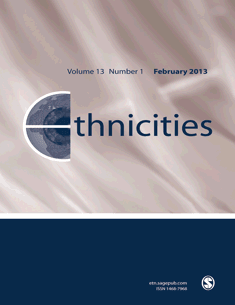
Ethnicities
Unraveling the Complexities of Race and IdentityEthnicities is a leading academic journal published by SAGE Publications Ltd, dedicated to exploring the complex dynamics of ethnicity, cultural identity, and social interactions within diverse communities. Since its inception in 2001, the journal has established a reputable position in the field of Cultural Studies, evidenced by its impressive Q1 ranking in the Cultural Studies category and Q2 ranking in Arts and Humanities (miscellaneous) as of 2023. With a Scopus ranking that places it in the top 8% of journals in Cultural Studies, Ethnicities aims to facilitate critical discourse, innovative research, and scholarly exchange related to ethnicity across global contexts. Researchers, professionals, and students interested in investigating the intricate intersections of race, identity, and social policy will find valuable insights within its pages. For further engagement and access to its comprehensive articles, the journal is available without Open Access options, serving as a vital resource for understanding contemporary issues in ethnicity and cultural relations.
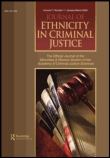
Journal of Ethnicity in Criminal Justice
Delving into the Impact of Ethnicity on Criminal Justice.Journal of Ethnicity in Criminal Justice, published by Routledge Journals, Taylor & Francis Ltd, is a premier academic platform that examines the intricate interplay between ethnicity and the criminal justice system. With an impact factor reflecting its robust scholarly influence and ranked in the Q1 quartile for both Anthropology and Law, this journal has become essential reading for researchers, professionals, and students interested in understanding the complexities of race, ethnicity, and justice in contemporary society. Covering key issues from 2003 to 2024, it features cutting-edge research that informs debates on policy and social justice, making it an invaluable resource for those dedicated to the advancement of knowledge in these critical fields. Although it is not an Open Access journal, its contributions remain significant, inviting a diverse readership to engage with the vital discussions surrounding ethnicity and criminal justice.
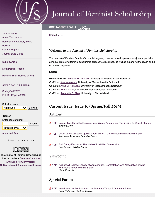
Journal of Feminist Scholarship
Advancing Feminist Thought, Shaping Social Justice.Welcome to the Journal of Feminist Scholarship, a distinguished academic platform dedicated to the exploration and advancement of feminist theories, gender studies, and social justice issues. Published by the University of Massachusetts Dartmouth, this open-access journal has been actively contributing to the field since 2011, ensuring accessibility to a diverse audience of researchers, scholars, and activists worldwide. With its commitment to interdisciplinary scholarship, the journal features peer-reviewed articles that challenge traditional narratives and highlight marginalized voices. Underpinned by a mission to foster critical discussions on gender, race, and identity, the Journal of Feminist Scholarship stands as a vital resource for those seeking to engage deeply with contemporary feminist discourse. Explore groundbreaking ideas and contribute to a more equitable academic landscape through this essential forum.

Anuario de Estudios Americanos
Exploring the Rich Tapestry of American StudiesAnuario de Estudios Americanos is a prestigious journal published by the Consejo Superior Investigaciones Cientificas (CSIC), focusing on the multifaceted dimensions of American studies. With an ISSN of 0210-5810 and an E-ISSN of 1988-4273, this Open Access journal has made its scholarly contributions freely accessible to researchers and enthusiasts alike since 1994, thus fostering international dialogue in the field. Based in Spain, the journal holds a commendable status, ranking in the Q2 category for both Cultural Studies and History as of 2023, which underscores its significance in these academic realms. Additionally, its Scopus rankings of #653/1760 in Arts and Humanities and #633/1304 in Social Sciences highlight its competitive standing among global publications. Anuario de Estudios Americanos aims to promote scholarly discourse and research on the historical, cultural, and social dimensions of the Americas, making it an essential resource for researchers, professionals, and students dedicated to exploring this dynamic area of study.

SOUTH ATLANTIC QUARTERLY
Unveiling the Rich Tapestry of Society and CultureSOUTH ATLANTIC QUARTERLY, published by DUKE UNIVERSITY PRESS, stands as a pivotal journal within the fields of Cultural Studies, Literature and Literary Theory, and Sociology and Political Science. With its rich historical foundation dating back to its inception in 1907, the journal has continuously provided a platform for rigorous scholarship and critical discourse. It has consistently achieved remarkable rankings, holding a distinguished place in the Q1 category across its relevant fields as of 2023, demonstrating its significant impact with Scopus rankings positioning it in the top percentiles. Though not an open-access journal, it offers a valuable repository of interdisciplinary insights that appeal to researchers, professionals, and students alike. The South Atlantic Quarterly remains essential for anyone looking to engage deeply with contemporary and historical issues spanning a broad spectrum of cultural and societal contexts, particularly through its insightful articles and critical reviews published biannually. Explore the multifaceted dimensions of the humanities and social sciences with this renowned journal, renowned for its commitment to intellectual rigor and innovative scholarship.

Latino Studies
Illuminating Latino Narratives through Interdisciplinary InsightsLatino Studies is a distinguished peer-reviewed journal published by Palgrave Macmillan Ltd, dedicated to advancing the interdisciplinary understanding of Latino cultures, histories, and societal contributions. With an ISSN of 1476-3435 and an E-ISSN of 1476-3443, this journal serves as a vital resource for researchers, professionals, and students engaged in Cultural Studies, History, Sociology, and Political Science. Recognized for its impactful scholarship, it holds a notable position in the 2023 journal rankings, landing in Q2 for Cultural Studies and History, and Q3 for Sociology and Political Science. The journal is committed to fostering insightful dialogue and reflection around the complex narratives of Latino communities, making it an essential forum for scholarly discourse. As it converges its scope from 2009 to 2024, Latino Studies continues to evolve alongside contemporary issues, encouraging innovative research that bridges gaps in the current academic landscape.
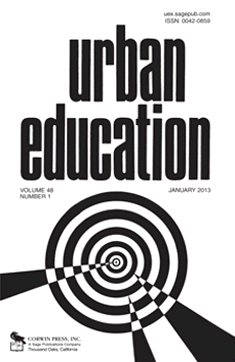
URBAN EDUCATION
Advancing Research for Urban Educational Excellence.URBAN EDUCATION, published by SAGE Publications Inc, stands at the forefront of the fields of education and urban studies. With a history dating back to 1965 and a converged publication reach extending to 2024, this journal plays a pivotal role in disseminating research that addresses the complexities of urban educational environments. Holding prestigious Q1 rankings in both education and urban studies categories, and boasting an impressive Scopus ranking, URBAN EDUCATION is recognized for its high impact on scholarly discourse and policy development. The journal aims to provide a platform for cutting-edge research that informs practice, enhances educational policy, and contributes to the improvement of educational outcomes in urban contexts. While it currently does not offer open access options, the rich content and critical insights produced within its pages remain invaluable to researchers, professionals, and students committed to addressing the myriad challenges in urban education.